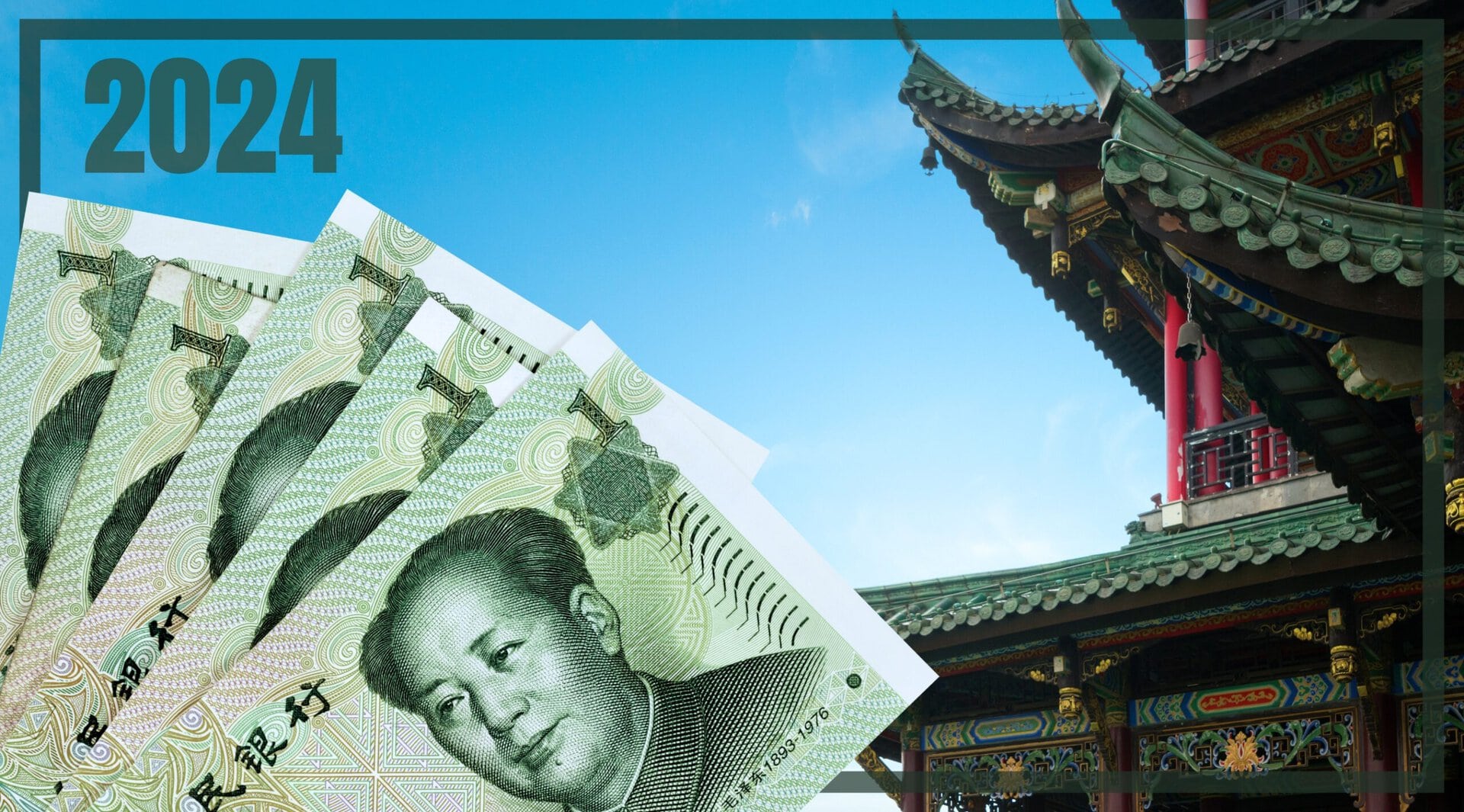Since the start of 2022, when China became the only major country not to lift coronavirus-related restrictions and resume full economic activity, the Chinese renminbi (RMB) has struggled on foreign exchange markets. Since January 2022, the US dollar has gained more than 12% against the renminbi, currently trading at 7.1873 against the Chinese currency, and that is despite the People’s Bank of China (PBOC) frequently intervening in markets to keep volatility at a minimum.
Since Beijing finally dropped its pandemic restrictions at the start of last year, the renminbi has continued to depreciate owing to an ongoing real estate crisis that has dampened investor confidence, and weak consumer spending that has forced the PBOC to maintain a loose monetary policy to try and encourage greater levels of spending. This has meant an era of low interest rates – the real interest rate in Beijing is around 2% – and therefore lower yields for foreign exchange traders, lowering interest in the RMB.
However, there are several reasons to suspect that the renminbi could make gains in 2024.
Chinese authorities told state-owned banks to step up intervention in the currency market this week, in a push to prevent a surge in volatility in the yuan, sources say https://t.co/0ZHQg9YtmF
— Bloomberg (@business) August 17, 2023
For one, traders widely suspect that the US dollar is overvalued – with some analysts suggesting that the greenback could be overvalued by as much as 12%. At the start of 2020, there was a huge movement into dollar-denominated assets as traders sought the safety of the greenback amidst the uncertainty of the pandemic.
This trend was reinforced last year when the Federal Reserve moved to hike interest rates to a thirty-year high in order to bring down inflation. This further encouraged traders to move into dollar assets and take advantage of the higher yields on offer, reducing the demand for the renminbi and many other currencies.
However, the Fed has expressed its intention to bring down interest rates this year – with Chairman Jay Powell suggesting earlier in the year that the central bank will make three quarter-point cuts in 2024. Markets also appear to have priced in rate cuts this year. Should this transpire, the move would lead to a lower interest rate differential between Chinese and US markets, potentially easing capital outflows from China and boosting demand for the renminbi.
Ken Cheung, chief Asian foreign exchange analyst at Mizuho Bank in Hong Kong, told Bloomberg that “the expected major central banks’ rate-cut cycle [in 2024] will help narrow the US-China rate spread and ease capital outflow pressure.” However, he cautioned that the upside potential for the renminbi could be limited by “foreign investors likely remaining cautious on Chinese investments due to the ongoing property turmoil, the weak recovery, and China-US tensions.”
China’s yuan will strengthen for the first time in three years in 2024 as narrowing interest-rate differentials ease capital outflows, a Bloomberg survey shows https://t.co/B1x3SjyXxa
— Bloomberg Markets (@markets) December 29, 2023
While China is perceived to have struggled with its post-pandemic recovery, stronger levels of economic growth this year could further boost renminbi demand. Indeed, Beijing has recently announced a growth target of 5% – compared to forecasts of 1% in France, 0.8% in the UK, and 0.2% in Germany. Strong levels of growth relative to other major economies could incentivise foreign exchange traders to boost their exposure to the renminbi and Chinese markets.
The PBOC has also unveiled various stimulus measures in a bid to encourage consumer spending and broader economic activity. For example, banks will be allowed to hold smaller cash reserves, with the central bank cutting the reserve requirement ration (RRR) by 50 basis points, a move that will release 1 trillion yuan in long-term capital. While this should boost China’s economic growth and lead to more positive sentiment in Chinese markets, this loose monetary policy will likely involve a period of lower interest rates and therefore a weaker yuan.
China has little choice but stimulus https://t.co/3TDbCiX5ma
— FT China (@ftchina) March 12, 2024
Several global investment banks have predicted that the renminbi will strengthen in 2024 – including Goldman Sachs, Standard Chartered, and Commerzbank – but they are all careful to emphasise that any potential gains will likely be limited.
Goldman Sachs analysts have argued that “while we view the strong policy-driven daily fixes of CNY as a clear indication of policymakers’ desire to reduce depreciation expectations and manage capital outflow pressures, we think a more sustained CNY appreciation would require a more convincing pickup in Chinese growth and improved prospects of asset market outperformance, which seems hard to envisage amid mixed activity data, continued property price declines, and negative inflation.”
Commerzbank has similarly suggested that, while some renminbi gains can be expected, the currency “will unlikely strengthen substantially.”
While foreign exchange traders should prepare for some gains on renminbi markets, owing to a lower interest rate differential with the US and higher growth, it would be reckless to be overly optimistic. Loose monetary policy and lingering investor concerns, particularly surrounding the real estate sector, will likely weigh on the renminbi and limit its appreciation potential.
Author: Harry Clynch
#China #Renminbi #RMB #ForeignExchange















